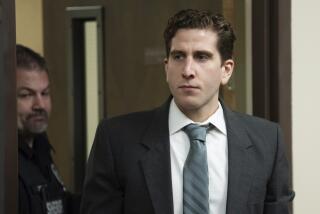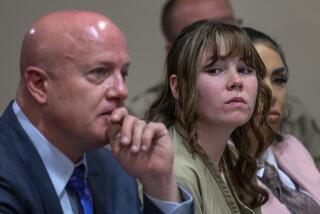James Holmes offers to plead guilty in Colorado massacre
CENTENNIAL, Colo. — James E. Holmes, accused of unleashing the Aurora movie theater massacre in July, has offered to plead guilty to killing 12 people and injuring 70 if prosecutors do not seek the death penalty.
In an unusual court filing, defense lawyers revealed Wednesday that they had made the standing offer weeks ago for Holmes to serve life in prison without possibility of parole for the July 20 mass shooting.
So far the prosecution has declined the offer, the document said.
Dist. Atty. George Brauchler of Colorado’s 18th Judicial District is to announce Monday whether he will seek the death penalty. Capital punishment is rare in Colorado, with only three people on death row.
Holmes’ attorneys have been expected to use an insanity defense, and their latest filing said they could still do so at trial or sentencing. If he is found to be insane or to suffer from a mental defect, he could not be put to death.
Holmes, 25, a former neuroscience doctoral student at the University of Colorado-Denver, is charged with 166 counts of first-degree murder, attempted murder and weapons violations in connection with the massacre in a packed suburban movie theater. The case evoked worldwide horror and became a touchstone in the national gun debate.
Two weeks ago, an impatient Chief Judge William Sylvester entered a not guilty plea on Holmes’ behalf after defense lawyers said they were not prepared to do so. The arraignment had been postponed several times, and the judge said the case needed to move forward.
The defense offer was revealed in a routine court scheduling document, making it that much more unusual, said Rick Kornfeld, a former federal prosecutor turned defense attorney who has been closely following the case. Typically, any negotiations between the two sides are kept under wraps until an agreement is reached, he said.
But Kornfeld called it a potentially smart strategic move by the defense because “it is clearly intended to put public pressure on the prosecution to resolve the case immediately.” He said a plea would not only offer closure for victims but save the state millions of dollars for a protracted trial.
The defense complained in the filing that it had offered the guilty plea prior to the March 12 arraignment. “It appears the only impediment to a resolution of this case would be if the prosecution chooses to seek the death penalty,” defense lawyers wrote. “Mr. Holmes is currently willing to resolve the case to bring the proceedings to a speedy and definite conclusion for all involved.”
It is unclear whether prosecutors will respond to Wednesday’s filing. Everyone in the case remains under a gag order.
Last month the defense unsuccessfully challenged the constitutionality of Colorado’s insanity defense laws, contending that if psychiatrists examined him under a court order, Holmes could lose his rights against self-incrimination. If he refused to cooperate, the defense said, that could be used against him and could prohibit his attorneys from calling witnesses to testify about his mental state.
Wednesday’s filing indicated that Holmes’ lawyers may still consider an insanity defense. “As previously stated in court, counsel for Mr. Holmes are still exploring a mental health defense, and counsel will vigorously present and argue any and all appropriate defenses at a trial or sentencing,” the filing said.
Holmes’ trial is set for Aug. 5 and is expected to last about a month. But the defense said in its filing that if the prosecution sought the death penalty the trial would have to be delayed and would take much longer.
Dave Hoover, whose nephew A.J. Boik was killed in the theater attack, said in an interview Wednesday that he had mixed feelings about any potential plea deal. “I loved my nephew dearly and we miss him every single day. I’m in favor of the death penalty and I’d like to see it in this case, but I’m not in favor of dragging this thing out. If it was over today, it would alleviate a lot of the pain and suffering.”
Ultimately, though, Hoover said he was confident the district attorney would make the right call.
More to Read
Sign up for Essential California
The most important California stories and recommendations in your inbox every morning.
You may occasionally receive promotional content from the Los Angeles Times.









